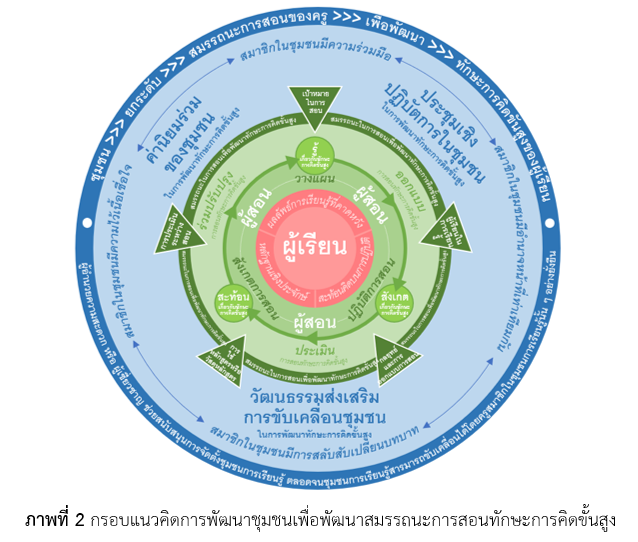การพัฒนาชุมชนการเรียนรู้วิชาชีพที่ส่งเสริมสมรรถนะของครูวิทยาศาสตร์ในการจัดการเรียนรู้ในเนื้อหาเฉพาะที่เน้นการคิดขั้นสูง
Main Article Content
บทคัดย่อ
การวิจัยนี้มีจุดประสงค์เพื่อพัฒนาชุมชนการเรียนรู้วิชาชีพที่ส่งเสริมสมรรถนะของครูในการจัดการเรียนรู้วิทยาศาสตร์ที่เน้นการคิดขั้นสูง โดยใช้การวิจัยเชิงคุณภาพที่มุ่งศึกษาปรากฏการณ์เชิงลึกเพื่อบรรยายสิ่งที่เกิดขึ้นชุมชนการเรียนรู้วิชาชีพสำหรับครูวิทยาศาสตร์มีลักษณะอย่างไรจึงจะทำให้ครูมีความสามารถในการจัดการเรียนรู้ที่เน้นการคิดขั้นสูง ผู้วิจัยได้พัฒนาชุมชนการเรียนรู้กับครูวิทยาศาสตร์จาก 3 โรงเรียน เก็บข้อมูลโดยการสังเกต สัมภาษณ์ และเอกสารใบงาน วิเคราะห์ข้อมูลโดยวิธีการเปรียบเทียบเหตุการณ์ โดยผลการวิจัยพบว่า 1) กระบวนการและกลไกของระบบชุมชนการเรียนรู้ควรช่วยปรับบทบาทของสมาชิกในชุมชนการเรียนรู้วิชาชีพส่งเสริมการเป็นผู้นำเพื่อการปฏิบัติอย่างยั่งยืน 2) กระบวนการและกลไกของระบบชุมชนการเรียนรู้ควรเน้นพัฒนาการเรียนรู้หรือการคิดขั้นสูงของผู้เรียนให้เป็นค่านิยมหลักร่วมกันที่ครูให้ความสำคัญในการพัฒนาการเรียนรู้ของนักเรียน และช่วยให้ครูมองเห็นว่านักเรียนมีการคิดอยู่ระดับใด มีปัญหาหรือไม่ 3) ครูทั้งสามโรงเรียนเลือกพิจารณาปัญหาเกี่ยวกับการคิดวิเคราะห์ของผู้เรียนเพราะคิดว่าการคิดวิเคราะห์เป็นการคิดขั้นสูงที่มีความไม่ยากจนเกินไป แต่ในช่วงเริ่มต้น ครูไม่ได้เข้าใจความหมายของการคิดวิเคราะห์อย่างลึกซึ้ง ทำให้ยากในการออกแบบแผนการจัดการเรียนรู้ที่เน้นการคิดวิเคราะห์ 4) ครูมีสมรรถนะการจัดการเรียนรู้ที่เน้นการคิดขั้นสูงแตกต่างกันมาจากภูมิหลังแตกต่างกัน โดยครูที่ไม่ได้มีภูมิหลังการศึกษาด้านการสอนวิทยาศาสตร์โดยตรง ยังไม่เข้าใจกระบวนการสืบเสาะทางวิทยาศาสตร์และการคิดอย่างนักวิทยาศาสตร์ (ซึ่งสอดคล้องกับการคิดขั้นสูง) จึงเป็นอุปสรรคอย่างหนึ่งในการจัดการเรียนการสอน 5) ครูส่วนใหญ่มีระดับสมรรถนะการสอนด้านการสอนอยู่ในระดับที่สูง พร้อมที่จะต่อยอดเพื่อพัฒนาและยกระดับการคิดขั้นสูงของผู้เรียน แต่อย่างไรก็ตาม พบว่าความเป้าหมายของการประเมินและวิธีประเมินยังอยู่ในระดับต่ำ ครูยังใช้การประเมินรวบยอดเป็นการประเมินหลัก
Article Details

อนุญาตภายใต้เงื่อนไข Creative Commons Attribution-NonCommercial-NoDerivatives 4.0 International License.
วารสารวิทยาศาสตร์และวิทยาศาสตร์ศึกษา (JSSE) เป็นผู้ถือลิสิทธิ์บทความทุกบทความที่เผยแพร่ใน JSSE นี้ ทั้งนี้ ผู้เขียนจะต้องส่งแบบโอนลิขสิทธิ์บทความฉบับที่มีรายมือชื่อของผู้เขียนหลักหรือผู้ที่ได้รับมอบอำนาจแทนผู้เขียนทุกนให้กับ JSSE ก่อนที่บทความจะมีการเผยแพร่ผ่านเว็บไซต์ของวารสาร
แบบโอนลิขสิทธิ์บทความ (Copyright Transfer Form)
ทางวารสาร JSSE ได้กำหนดให้มีการกรอกแบบโอนลิขสิทธิ์บทความให้ครบถ้วนและส่งมายังกองบรรณาธิการในข้อมูลเสริม (supplementary data) พร้อมกับนิพนธ์ต้นฉบับ (manuscript) ที่ส่งมาขอรับการตีพิมพ์ ทั้งนี้ ผู้เขียนหลัก (corresponding authors) หรือผู้รับมอบอำนาจ (ในฐานะตัวแทนของผู้เขียนทุกคน) สามารถดำเนินการโอนลิขสิทธิ์บทความแทนผู้เขียนทั้งหมดได้ ซึ่งสามารถอัพโหลดไฟล์บทความต้นฉบับ (Manuscript) และไฟล์แบบโอนลิขสิทธิ์บทความ (Copyright Transfer Form) ในเมนู “Upload Submission” ดังนี้
1. อัพโหลดไฟล์บทความต้นฉบับ (Manuscript) ในเมนูย่อย Article Component > Article Text
2. อัพโหลดไฟล์แบบโอนลิขสิทธิ์บทความ (Copyright Transfer Form) ในเมนูย่อย Article Component > Other
ดาวน์โหลด ไฟล์แบบโอนลิขสิทธิ์บทความ (Copyright Transfer Form)
เอกสารอ้างอิง
Akerson, V.L., Pongsanon, K., Rogers, M. A. P., Carter, I. and Galindo, E. (2017). Exploring the use of lesson study to develop elementary preservice teachers’ pedagogical content knowledge for teaching nature of science. International Journal of Science and Mathematics Education, 15(2), 293-312.
Anderson, J. (2019). In search of reflection-in-action: An exploratory study of the interactive reflection of four experienced teachers. Teaching and Teacher Education. 86. 1-17. https://doi.org/10.1016/j.tate.2019.102879
Barendsen, E. and Henze, I. (2019). Relating teacher PCK and teacher practice using classroom observation. Research in Science Education, 49, 1141- 1175.
Bell, B. and Gilbert, J. (2005). Teacher Development: A Model from Science Education. Taylor & Francis e-library.
Berry, A., Loughran, J. and van Driel, J. H. (2008). Revisiting the roots of pedagogical content knowledge. International Journal of Science Education, 30(10), 1271 – 1279
Bybee, R. W. (2013). The Case for STEM Education: Challenges and Opportunities. NSTA.
Carmi, T., Guberman, A. and Brandeis, R.C. (2022). PLC tools: promoting learning about learning in a teachers’ professional community. Professional Development Education. (OnlineFirst).
Clarke, A. and Erickson, G. L. (2003). Teacher inquiry: Living the research in everyday practice. New York: Routledge Falmer.
Cochran-Smith, M. and Lytle, S. L. (1993). Inside/outside: Teacher research and knowledge. New York: Teachers College Press.
Creswell, J. W. and Miller, D. L. (2000). Determining validity in qualitative inquiry. Theory into Practice, 39(3), 124-130.
Dudley P., (2011). Lesson study: a handbook [online]. Lesson Study UK. Educational Action Research, 8(1), 179-193.
Hanuscin, D. L., Cisterna, D. and Lipsitz, K. (2018). Elementary teachers’ pedagogical content knowledge for teaching structure and properties of matter. Journal of Science Teacher Education, 29(8), 665-692.
Gess-Newsome, J. (2015). A Model of Teacher Professional Knowledge and Skill Including PCK. A. Berry, P. Friedrichsen, J. Loughran (Eds.), Re-Examining Pedagogical Content Knowledge In Science Education, Routledge (2015), pp. 28-42.
Institute for the Promotion of Teaching Science and Technology (IPST). (2018). PISA2015 Assessment of Reading Science and Mathematics Excellence and Educational Equality. Bangkok: Success Public Company Limited.
Karlsen, A.M. (2022). Investigating teacher learning in Lesson Study: the important link between reported observations and change of plans. Professional Development in Education. 48(1), 53-69.
Leitch, R. and Day, C. (2000). Action research and reflective practice: Towards a holistic view. lessons improve Japanese education. American Educator, 22(4), 179 – 183.
Lewis, C. and J. Hurd. (2011). Lesson Study Step by Step: How Teacher Learning Communities Improve Instruction. Portsmouth, NH: Heinemann.
Lewis, C. C., and Tsuchida, I. (1998). A lesson is like a swiftly flowing river: How research lessons improve Japanese education. Improving School, 2(1), 48 – 56.
Lewis, E.B., Baker, D.R., Bueno Watts, N. and Lang, M. (2014). A professional learning community activity for science teachers: How to incorporate discourse-rich instructional strategies into science lessons. Science Educator, 23(1), 1-9.
Panyanukit, P. (2019). Developing Grade-11 Students’ Critical Thinking Skills Using 6-Es Inquiry Integrated STEM Activity on The Fossil Fuels and Productions Topic. Thesis: Master of Education (Science Education), Kasetsart University.
McNiff, J. (1993). Teaching as learning: An action research approach. London: Routledge.
Morine-Dershimer, G., and Kent, T. (1999). The complex nature and sources of teachers´ pedagogical knowledge. In: Gess-Newsome, J.; Lederman, N.G. (Eds.) Examining Pedagogical Content Knowledge, Dordrecht, The Netherlands: Kluwer Academic Publishers, pp. 21-50.
Park, S. and Oliver, J.S. (2008). Revisiting the conceptualisation of pedagogical content knowledge (PCK): PCK as a conceptual tool to understand teachers as professionals, Research in Science Education, 38(3), 261-284.
Schön, D.A. (2017). The reflective practitioner: How professionals think in action. Routledge.
Schön, D.A. (1983). The Reflective Practitioner: How Professionals Think in Action. New York: Basic Books.
Shulman, L.S. (1986). Those who understand: Knowledge growth in teaching. Educational Researcher, 15(2), 4-14.
Tan, O.S., Liu, W.C., and Low, E.L. (2012). Educational reforms and teacher education innovations in Singapore. In O. S. Tan (Ed.), Teacher education frontiers: International perspectives on policy and practice for building new teacher competencies (pp. 71–91). Singapore: Cengage Learning Asia.
Tobin, K., Tippins, D.J. and Gallard, A.J. (1994). Research on instructional strategies for teaching science. In D.L. Gabel. (Ed.). Handbook of research on science teaching and learning. New York: Macmillan.
Zeichner, K. (2007). Accumulating knowledge across self-studies in teacher education. Journal of Teacher Education, 58(1), 36 – 46.
Zohar, A. (2004). Higher order thinking in science classrooms: Students’ learning and teachers’ professional development. Dordrecht, The Netherlands: Kluwer.


